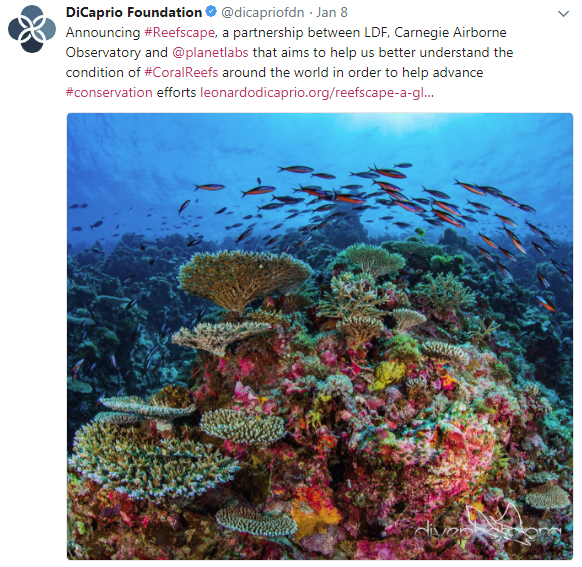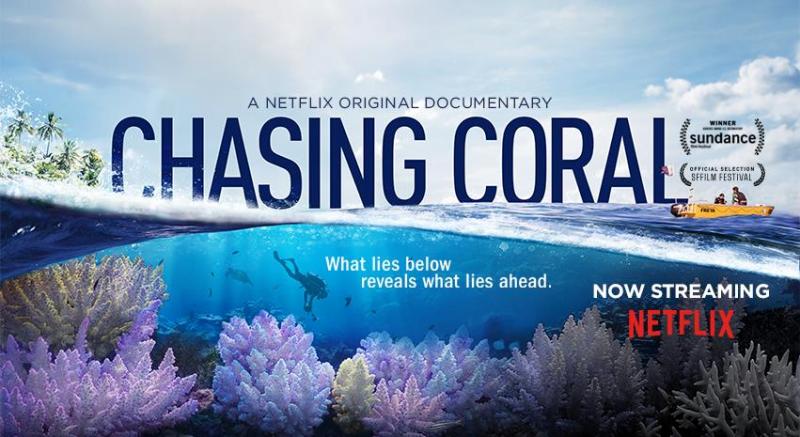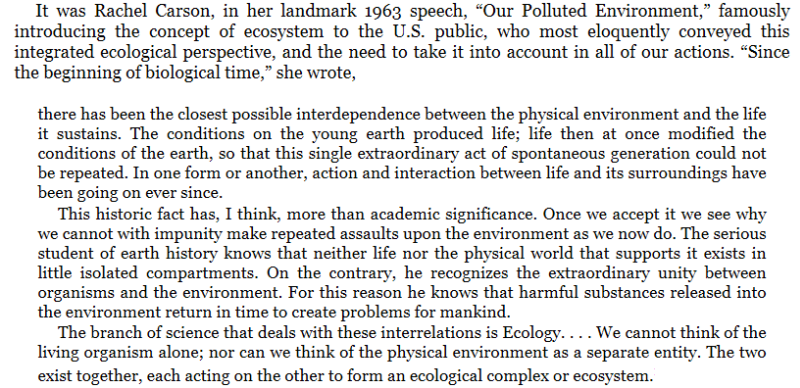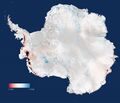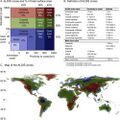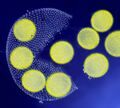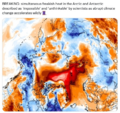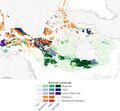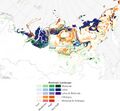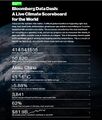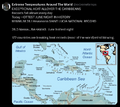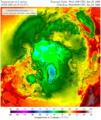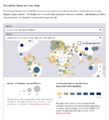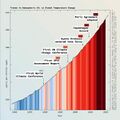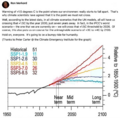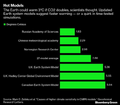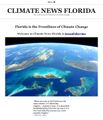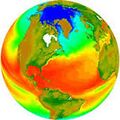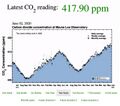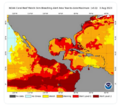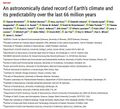Category:Ocean Science: Difference between revisions
Siterunner (talk | contribs) No edit summary |
Siterunner (talk | contribs) No edit summary |
||
| Line 70: | Line 70: | ||
<big>'''''Mapping & Tracking | <big>'''''Mapping & Tracking'''''</big> | ||
| Line 83: | Line 83: | ||
* '''http://oceansci.ucsc.edu/''' | * '''http://oceansci.ucsc.edu/''' | ||
<big>'''''Global Impacts of Ocean Acidification and Warming'''''</big> | |||
Revision as of 19:45, 14 October 2019
<addthis />
Impacts of Ocean Warming /AGU Science - Geophysics
Molecular Basis for Understanding the Impacts of Ocean Warming
Peter G. Brewer
Published: 31 July 2019
A grand challenge for ocean chemists in the years ahead lies in the need to tackle the chemical consequences of ocean warming with the same rigor and intensity that has been brought to bear on the physical chemistry of ocean acidification...
The ocean absorbs some 93% of all greenhouse gas‐generated heat, and ocean warming is already creating observable impacts on marine life. To make reliable projections for the future, we cannot rely on Ptolemy‐like rules, built as something to match field observations, to apply in the years to come. Instead, we will need to apply the laws of chemical physics to calculate and predict the changes that ocean warming will have on the physical properties of sea water and the associated impacts on marine life. This includes treating water as a fluid with defined temperature‐and pressure‐dependent chemical structures.
Sea water is 96.5% water, and some 78–85% of water in the oceans has a form with a much higher molecular weight than the water molecule that typically comes to mind, with a single oxygen and two hydrogens. These varied structures are now directly relatable to the high heat capacity of water, why the speed of sound is faster in warmer water, and the viscosity of sea water that provides constraints on microbial motion. Microbial activity is a key driver to the amount of oxygen in different parts of the ocean, and if their activity is affected by increased warmth, it seems quite possible that large regions may exist with no oxygen at all. Marine life responds strongly to changing oxygen status. This is because both warmer waters can hold less oxygen, and because warming drives higher rates of microbial growth.
Marine fisheries, and the great majority of all marine species, are already responding to these forces and are migrating toward cooler waters near the poles. Using known laws of science to connect chemistry, physics, and ocean warming would allow the ocean sciences to proceed on firmer footing and to improve future projections of the impact of ocean warming. The ocean is now experiencing the twinned invasions of heat and fossil fuel carbon dioxide that drive up its acid level. It is the combined impact of these two great waves, both resulting from our use of fossil fuels, that will be critical...
Monitoring Earth's Oceans from Space
- Will the new availability of sophisticated, satellite-based technologies, coupled with the democratization of online data about the health of our environment, help ensure that these positive advancements live up to their potential to protect the oceans?
"What percentage of the Earth is covered by oceans?"'
71% -- Via http://www.noaa.gov/oceans-coasts
○ ○ ○ ○ ○ ○ ○ ○
Science on the Seas (SOS)
○ ○ ○ ○ ○ ○ ○ ○
Join in Planet Scientists, do some difference-making Citizen Science
○ ○ ○ ○ ○ ○ ○ ○
Mapping & Tracking
Global Impacts of Ocean Acidification and Warming
- To gather a more comprehensive understanding of the condition of global reef ecosystems, we need a way to assess and monitor them on a large geographic scale.
- The Reefscape project aims to improve our understanding of the condition of coral reefs worldwide, while simultaneously developing spectral libraries needed to advance the development of a new satellite mission.
- New satellites, such as those from Planet (formerly Planet Labs), are, as of 2017, able to capture near-daily imagery of coral reefs worldwide. Planet’s high-resolution imagery of reef locations provides new imaging, science and understanding of the composition and extent of shallow, horizontally oriented reefs.
Reefs and Coral, sentinel species
Coral reefs in peril as ocean environment is transformed
○
Ocean Research Missions - http://schmidtocean.org/
○
○
Subcategories
This category has the following 21 subcategories, out of 21 total.
A
B
C
E
F
G
N
O
P
S
T
W
Pages in category "Ocean Science"
The following 99 pages are in this category, out of 99 total.
A
C
- Carbon Brief
- Citizen Science
- Climate Change - Global Warming Keyword-Terms
- Climate Change Denier Talking Points -- and Rebuttals
- Climate Change Summit Paris
- Climate Desk
- Climate Law Blog @Columbia Law School
- Climate migration
- Climate News
- Climate News Events Archive ... 1970 to Today
- Climate Plans Enforcement - Resources
- Copernicus EU
E
- Earth and Space, Politics
- Earth at Night
- Earth from NASA
- Earth Imaging-New Space
- Earth Right Now
- Earth Science
- Earth Science Eco-Fields
- Earth Science Research from Space
- Earth Science Vital Signs
- EarthTime
- Ecolivia
- Environmental agreements
- Environmental movement
- Environmental protection
- Environmental Rules Rolled Back
- ESA Living Planet Announcement - May 2022
- Ethics and Climate Change
- European Union Green Deal - Fit for 55
- Extinction
- ExxonMobil and US House Science Committee v US Attorneys General and Environmental Groups
G
- Glasgow Climate Summit - Pledges, Promises, Declarations - What's Next Up
- Global Climate Action Summit
- Global Fishing Watch
- Global warming
- Google Earth
- GP360 NewPages
- Green Marketing
- Green Stories of the Day
- Green Stories of the Day - GreenPolicy360 Archive
- GreenPolicy360 Archive Highlights 2013
- GreenPolicy360 Archive Highlights 2014
- GreenPolicy360 Archive Highlights 2015
- GreenPolicy360 Archive Highlights 2016
- GreenPolicy360 Archive Highlights 2017
- GreenPolicy360 Archive Highlights 2018
- GreenPolicy360 Archive Highlights 2019
- GreenPolicy360 Archive Highlights 2020
- GreenPolicy360 Archive Highlights 2023
- GreenPolicy360 Highlights
P
S
U
Media in category "Ocean Science"
The following 200 files are in this category, out of 840 total.
(previous page) (next page)- 2015 Hottest year a.pdf ; 316 KB
- 2015 Hottest year b.pdf ; 308 KB
- 2020 record temperatures.png 800 × 502; 358 KB
- 3-15-2016 10-49-38 AM.png 702 × 862; 396 KB
- 3-15-2016 12-29-07 PM.png 538 × 701; 201 KB
- 5 19 14 andrew antarcticaelevationchanges-640x547.jpg 640 × 547; 59 KB
- 7-20-2020 GreenPolicy360 RT No.2.jpg 591 × 510; 125 KB
- A Brief History of the Future - 2s.jpg 448 × 309; 70 KB
- A Fierce Green Fire.jpg 208 × 314; 13 KB
- A scorching year, what about the 360 warming data.jpg 600 × 706; 106 KB
- About Baselines and Change.png 592 × 312; 33 KB
- About website of The Invading Sea.png 800 × 343; 126 KB
- Acceptance on behalf of the United States of America.png 448 × 306; 62 KB
- Act now for a livable future.png 501 × 275; 272 KB
- Actually watching the planet breathe.png 800 × 446; 649 KB
- Ag production and GHG emissions.jpg 680 × 510; 33 KB
- Against the Tide - Cover - by Cornelia Dean.jpg 308 × 475; 57 KB
- Against the Tide by Cornelia Dean.jpg 600 × 800; 265 KB
- Air pollution moves globally.png 620 × 412; 256 KB
- Aldis zone blog.jpg 500 × 498; 67 KB
- Algae release -nikon-small-world-competition-2017-winners.jpg 640 × 576; 89 KB
- All Alone In the Night.png 831 × 426; 275 KB
- All species day with homo sapien in Santa Fe .jpg 640 × 369; 98 KB
- Amazon-rainforest (2).jpg 600 × 338; 68 KB
- Amazon-rainforest (3).jpg 300 × 225; 57 KB
- Andrew Wheeler confirmed to head EPA.jpg 753 × 600; 85 KB
- Another year, another record.png 800 × 294; 251 KB
- Antarctica science - warming water, shrinking ice.png 640 × 356; 174 KB
- Antarctica-2018.jpg 768 × 1,024; 82 KB
- Anthropocene.jpg 450 × 187; 18 KB
- AOC re climate task force - july 8 2020.jpg 585 × 203; 38 KB
- April 28, 2016.png 586 × 415; 159 KB
- Arctic - Antarctic - Breaking.png 639 × 600; 903 KB
- Arctic - Kolbert - 2023.png 553 × 476; 274 KB
- Arctic 30.1 C at 62.5 N.jpg 800 × 432; 80 KB
- Arctic drilling ban Dec 21, 2016.png 692 × 536; 119 KB
- Arctic heat in Russia-Siberia 2020.gif 784 × 408; 3.6 MB
- Arctic mdl 1990-2010.jpg 720 × 667; 149 KB
- Arctic Melt - 1950-2020.png 640 × 349; 287 KB
- Arctic Sea Ice Area graphic thru 2016.png 640 × 355; 382 KB
- Arctic Sea Ice News.png 800 × 439; 458 KB
- Arctic sea ice watch 25 yrs of ice cover change.png 697 × 386; 314 KB
- Arctic Siberia Heatwave - Again - June 2021.jpg 640 × 360; 83 KB
- Arctic-asia mdl 1990-2010.jpg 720 × 667; 158 KB
- Arctic-March30,2019.jpg 797 × 600; 126 KB
- Arctic-Siberia-6-20-2020.jpg 478 × 644; 148 KB
- Arctic-swipa-spm.pdf ; 4.58 MB
- AskNatureAvatar s.png 200 × 200; 14 KB
- Atmosphere Science.jpg 800 × 600; 45 KB
- Atmospheric Experiment of Humanity.jpg 519 × 574; 201 KB
- Audubon study ms.png 529 × 434; 437 KB
- Away fly the Doves March4,2015.png 582 × 409; 167 KB
- Banking - finance - climate - Mann-1.jpg 452 × 640; 162 KB
- Banking - finance - climate - Mann-2.jpg 452 × 640; 164 KB
- Barrier island hubris 6-29-2021.jpg 490 × 635; 111 KB
- Battle for Democracy.jpg 640 × 123; 24 KB
- Biden - clean energy ambitions.JPG 640 × 334; 31 KB
- Biden introduces leadership team - Nov 24 2020.jpg 800 × 644; 173 KB
- Biden re Earth Day 2023.png 640 × 400; 155 KB
- Biden selects Kerry as special climate envoy.jpg 592 × 505; 87 KB
- Biden urged to act - Oct 18 2021 - The Guardian.png 663 × 600; 497 KB
- Biden's assembled an all-star climate team 4-21-2021.jpg 682 × 732; 309 KB
- Biden-Sanders Unity Task Force on Climate.jpg 701 × 780; 139 KB
- Big Oil Rocked by News May 27 2021.jpg 639 × 600; 84 KB
- Big Wobble 2020.jpg 507 × 342; 79 KB
- Bill McKibben switches gears-Sept 2021.jpg 518 × 265; 78 KB
- Bill McKibben to next generations.JPG 700 × 700; 203 KB
- Bill Nelson on Global Temp Rise and Climate Change.png 640 × 353; 100 KB
- Bill Nye explains.jpg 543 × 508; 88 KB
- Bill Nye The Planet's on Fire.jpg 800 × 675; 106 KB
- Biodiversity COP15 Conference - Dec 2022.png 640 × 417; 637 KB
- Biodiversity COP15 News - 1.png 600 × 687; 288 KB
- Biodiversity COP15 News - 2.png 600 × 636; 340 KB
- Biodiversity-by-dreamchaotic.jpg 600 × 173; 66 KB
- Bloomberg Carbon Clock 10-26-2021 8-47-05 AM EST.png 800 × 195; 356 KB
- Bloomberg Live Climate Data Dashboard.jpg 640 × 756; 156 KB
- Blue atmosphere from Astro Wheelock.jpg 800 × 532; 16 KB
- Blue fragile edge thin blue line.jpg 1,200 × 798; 26 KB
- Blue-Green & Planet Citizens, Planet Scientists.png 549 × 844; 94 KB
- Blue-green phyto swirling 2015.png 357 × 605; 409 KB
- Brazil INDC 2015.png 592 × 366; 301 KB
- Breakpoint - Reckoning with America's Environmental Crisis.jpg 329 × 500; 49 KB
- Bridenstine talks.png 1,485 × 911; 223 KB
- Burst of climate denial as Trump presidency ends.jpg 632 × 604; 92 KB
- CAIT Map 1.png 800 × 415; 123 KB
- California's kelp forests and coastal biodiversity diminished.png 532 × 754; 307 KB
- Car heating and cooling.png 465 × 635; 261 KB
- Carbon Brief - Greenhouse gas levels 2021.png 640 × 436; 292 KB
- Carbon Clock March 23, 2017.png 800 × 194; 44 KB
- Caribbean Sea hot - June night 2024.png 676 × 600; 386 KB
- Carl Sagan at the Emerging Issues Forum - 1990.png 360 × 460; 192 KB
- Carl Sagan at the Emerging Issues Forum.png 747 × 600; 600 KB
- Carl Sagan, 1985.PNG 480 × 566; 331 KB
- Carl Sagan, the atmosphere unifies and connects all of our world.png 360 × 390; 229 KB
- CCI-June29,2016.png 760 × 902; 201 KB
- Cellular Landscape.jpg 300 × 336; 44 KB
- CFCs then HFCs.png 800 × 382; 169 KB
- CFSV2 world temp July 3, 2023.png 600 × 800; 513 KB
- CH4 graph - 1980-2020.JPG 640 × 446; 22 KB
- Challenge of Acting for the Commons.png 700 × 548; 175 KB
- Changes in carbon dioxide per 1000 years - via Climate Central.jpg 682 × 424; 34 KB
- Chasing Coral.jpg 800 × 437; 65 KB
- Citizens Climate Lobby - Save Our Future Act 2021.jpg 518 × 262; 77 KB
- Citizens Climate Lobby - Tampa Bay.jpg 586 × 515; 125 KB
- Climate Action 25th conf in Madrid.jpg 680 × 510; 22 KB
- Climate activist - Steven Schmidt - 1978 on.png 600 × 480; 174 KB
- Climate Books - 2020.jpg 800 × 450; 69 KB
- Climate cases on the rise - Nature, Sept 2021.png 800 × 562; 181 KB
- Climate Change Agr Nov 4, 2016.png 800 × 523; 296 KB
- Climate Change Conf Nov 6-17.png 464 × 488; 107 KB
- Climate Change COP27 - Nov 11 2022 US Representatives.jpg 712 × 444; 54 KB
- Climate Change COP27 - Nov 11 Kathy Castor.jpg 712 × 710; 77 KB
- Climate Change Laws - database collaboration.png 640 × 271; 76 KB
- Climate Change Laws of the World - database.PNG 768 × 845; 383 KB
- Climate Change Litigation Databases Climate Law.png 800 × 330; 73 KB
- Climate Change US EPA.jpg 600 × 703; 95 KB
- Climate Conferences 1979-2020.jpg 768 × 768; 121 KB
- Climate Crisis - Emily Atkin Heated No. 1.jpg 537 × 453; 61 KB
- Climate Crisis and the Global Green New Deal.jpg 293 × 418; 33 KB
- Climate debate.jpg 493 × 580; 129 KB
- Climate Desk.jpg 390 × 226; 21 KB
- Climate diplomacy is failing - June 2020.jpg 592 × 440; 71 KB
- Climate Emergency Institute - Oct 2022.png 610 × 600; 274 KB
- Climate Emergency Institute -- 2021.jpg 800 × 450; 55 KB
- Climate emergency.jpg 800 × 450; 69 KB
- Climate Headline News around the World - July 2023.jpg 600 × 704; 151 KB
- Climate Lawsuit-Our Childrens Trust-Florida.png 462 × 760; 289 KB
- Climate Legacy of Biden.jpg 600 × 687; 265 KB
- Climate Models.png 639 × 558; 123 KB
- Climate News - Oct 28 2022.jpg 626 × 600; 88 KB
- Climate News - United Nations Report - Feb 2022.png 768 × 878; 539 KB
- Climate News Dec 4 2023 in Dubai.png 800 × 1,037; 649 KB
- Climate News Florida.jpg 600 × 697; 113 KB
- Climate Plan pledges as Oct6,2015.png 529 × 409; 101 KB
- Climate Plans Enforcement - Resources - GreenPolicy.png 768 × 897; 686 KB
- Climate poll - Florida.png 640 × 267; 36 KB
- Climate Science Special Report - US - November 2017.jpg 800 × 445; 122 KB
- Climate strike - Week 171.png 739 × 600; 834 KB
- Climate Strike Around the World - Sep20,2019.jpg 700 × 830; 119 KB
- Climate Summit - Leonardo DiCaprio.png 600 × 663; 521 KB
- Climate Summit live updates - Nov 2 2021.png 751 × 600; 420 KB
- Climate Summit planned-1.jpg 800 × 301; 53 KB
- Climate Summit planned-2.jpg 800 × 187; 31 KB
- Climate Summit planned-3.jpg 800 × 278; 44 KB
- Climate Summit planned-4.jpg 800 × 241; 41 KB
- Climate Time Machine NASA Earth Science.png 981 × 571; 378 KB
- Climate usa 60 years on.jpg 800 × 480; 34 KB
- ClimateNews 360.jpg 172 × 172; 9 KB
- ClimateNewsFlorida.jpg 448 × 191; 36 KB
- Clouds over the Atlantic Ocean wiki cc.jpg 1,202 × 804; 302 KB
- CO2 at Mauna Loa data - June 02, 2020 - 417.90 ppm.jpg 640 × 566; 66 KB
- CO2 cumulative emissions 1850 - 2021 - countries.jpg 640 × 462; 211 KB
- CO2 Emissions per Capita by Country 1960-2014.png 800 × 451; 424 KB
- CO2 emissions-around-the-world.png 800 × 595; 123 KB
- CO2 global pathways via IPCC AR6 - how will we respond.jpg 800 × 450; 57 KB
- CO2 higher than in the past 5 million yrs.jpg 514 × 285; 62 KB
- Coastal Connecticut sea level rise.png 480 × 549; 396 KB
- Connect with Nature.png 405 × 280; 17 KB
- COP26 Climate Summit concludes.jpg 600 × 800; 160 KB
- COP26 concludes - 2.png 648 × 467; 177 KB
- COP26 concludes - 3.png 648 × 713; 416 KB
- COP26 concludes.png 648 × 528; 329 KB
- COP26 in GLASGOW - 31 OCT-12 NOV 2021.jpg 800 × 264; 51 KB
- COP27 'opening speech'.png 640 × 460; 160 KB
- COP28 News - Dec 13 2023.png 800 × 898; 410 KB
- Copernicus EU logo.jpg 400 × 400; 41 KB
- CopernicusEU - Sentinel5P Atmosphere Monitoring Mission - 2.jpg 795 × 1,477; 654 KB
- CopernicusEU - Sentinel5P Atmosphere Monitoring Mission.png 583 × 465; 222 KB
- Coral bleached 720.jpg 720 × 405; 276 KB
- Coral bleaching - August 2023.png 488 × 430; 261 KB
- Coral bleaching - NOAA - August 2023.png 488 × 338; 201 KB
- Coral bleaching Great Barrier Reef 2016.jpeg 630 × 472; 91 KB
- Coral growing-Mott Lab,Florida.jpg 800 × 382; 114 KB
- Coral reef rejuvenation-montage.png 569 × 236; 318 KB
- Covering Climate Now.jpg 493 × 498; 67 KB
- Cradle of Civilization - and climate change.jpg 640 × 360; 70 KB
- Cube Launch from the ISS via Tim Peake.png 640 × 409; 218 KB
- Cumulative CO2 Emissions by Country Since 1850.png 800 × 445; 445 KB
- Cyanobacteria Prochlorococcus worldmapping MIT.jpg 473 × 321; 60 KB
- Dated record of Earths climate - Science Report Sept 10 2020.jpg 735 × 669; 192 KB
- David-brower-environmental-movement-cover.jpg 530 × 800; 89 KB
- Dawn above Earth-May 2018-AstroPOV.png 640 × 712; 204 KB
- Death Valley ... the heat, what its like.jpg 640 × 381; 62 KB
- Defend Our Future 6-1-2020.jpg 585 × 458; 103 KB
- Democratic Climate Plan-Introduced June 2020.jpg 528 × 561; 117 KB
- Democratic National Convention-62 climate speakers.jpg 443 × 407; 57 KB
- Democratic Party Climate Bill - Aug 2022.png 640 × 269; 70 KB
- Democratic Party pres candidates debate in Miami-June 2019.jpg 800 × 534; 124 KB
- Democratic presidential candidates on the Green New Deal.jpg 800 × 359; 57 KB
- Denying human-caused climate change.jpg 639 × 620; 129 KB
- DeSantis against climate science - 2.jpg 640 × 480; 122 KB
